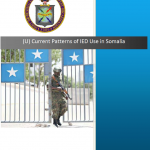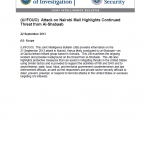
Shabaab al-Mujahideen (aka al-Shabaab, aka Mujahideen Youth Movement) is the Salafist-Jihadist off-shoot of the Mogadishu-based Islamic Courts Union (ICU). Al-Shabaab’s leaders maintain connections with al-Qaeda, and receives financial, logistical, and rhetorical support. The group is fighting the internationally recognized TFG for control of Somalia’s southern cities, and ultimately seeks to control the entire Horn of Africa. Al-Shabaab employs IEDs in support of its broader strategy of ousting the TFG and the contingent of African Union peacekeepers (mostly from Uganda and Burundi) protecting the TFG, called the African Mission in Somalia (AMISOM). As a result, their IEDs target TFG and AMISOM personnel and operations. Al-Shabaab will continue to focus its IED efforts against TFG and AMISOM operations, primarily in Mogadishu, as part of an al-Qaeda-inspired strategy of attrition and exhaustion.


